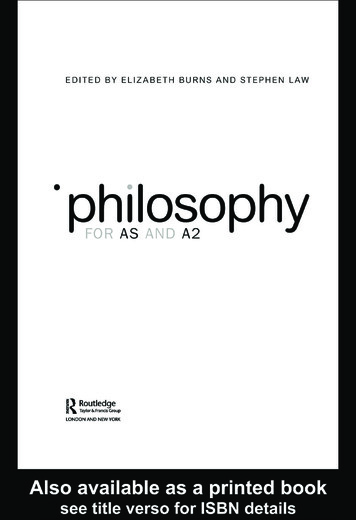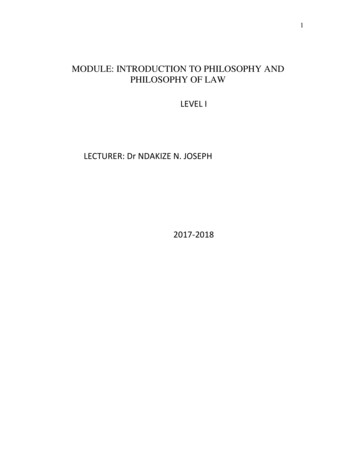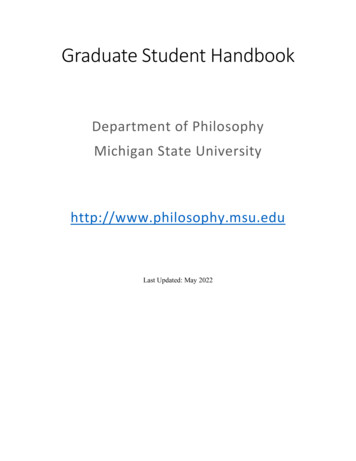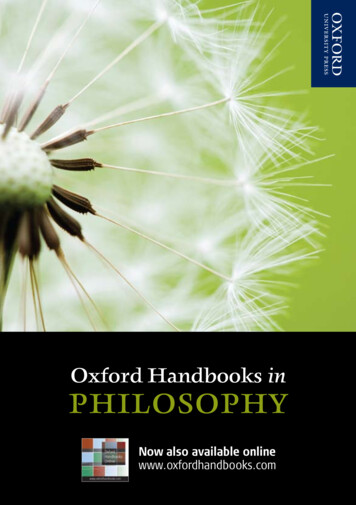
Transcription
philosophyFOR AS AND A2 Philosophy for AS and A2 is the definitive textbook for students of Advanced Subsidiaryor Advanced Level courses, structured directly around the specification of the AQA – the onlyexam board to offer these courses. Following a lively foreword by Nigel Warburton, author ofPhilosophy: The Basics, a team of experienced teachers devote a chapter each to the six themescovered by the syllabus:AS Theory of Knowledge Moral Philosophy Philosophy of ReligionA2 Philosophy of Mind Political Philosophy Philosophy of ScienceEach of the six themed chapters includes: A list of key concepts, to introduce students to the topicBite-size sections corresponding to the syllabus topicsActual exam questions from previous yearsSuggested discussion questions to promote debateText-boxes with helpful summaries, case-studies and examplesAn annotated further reading list directing students towards the best articles, books andwebsitesA comprehensive glossary, providing a handy reference pointThere is a final chapter on exam preparation, designed to help students get to grips with theexamination board requirements.Philosophy for AS and A2 is written by a team of expert teachers based at Heythrop College –part of the University of London – which specialises in teaching philosophy and theology.The editors: Elizabeth Burns is an experienced teacher of both GCSE and A Level, andStephen Law is the author of three bestselling philosophy books: The Philosophy Files, TheOuter Limits and The Philosophy Gym. The contributors: Michael Lacewing, Patrick Riordan,Janice Thomas and Nicholas Wilson.
EDITED BY ELIZABETH BURNS AND STEPHEN LAW philosophyFOR AS AND A2
First published 2004by Routledge11 New Fetter Lane, London EC4P 4EESimultaneously published in the USA and Canadaby Routledge29 West 35th Street, New York, NY 10001Routledge is an imprint of the Taylor & Francis GroupThis edition published in the Taylor & Francis e-Library, 2004. 2004 Elizabeth Burns, Stephen Law, Michael Lacewing,Patrick Riordan, Janice Thomas, Nicholas WilsonForeword 2004 Nigel WarburtonAll rights reserved. No part of this book may be reprinted orreproduced or utilized in any form or by any electronic, mechanical,or other means, now known or hereafter invented, includingphotocopying and recording, or in any information storage orretrieval system, without permission in writing from the publishers.British Library Cataloguing in Publication DataA catalogue record for this book is available from the British LibraryLibrary of Congress Cataloging in Publication DataPhilosophy for AS and A2/edited by Elizabeth Burns and Stephen Law. – 1st ed.p. cm.Includes bibliographical references and index.1. Philosophy–Textbooks. I. Burns, Elizabeth, 1963– . II. Law, Stephen.III. Title: Philosophy for advanced subsidiary and advanced leveB74.P49 2004107'.6–dc 222003027166ISBN 0-203-42025-X Master e-book ISBNISBN 0-203-68050-2 (Adobe eReader Format)ISBN 0–415–33562–0 HbkISBN 0–415–33563–9 Pbk
CONTENTS List of contributorsxvForeword Nigel WarburtonxviiAcknowledgementsINTRODUCTIONxxMichael Lacewing and Elizabeth BurnsWhy study philosophy?AS and A2 philosophyAbout this bookRecommended reading1 THEORY OF KNOWLEDGE (UNIT 1)Introduction11244Janice Thomas55Empiricism and rationalismRationalismKnowledge of existenceInnate knowledgeKnowledge as a deductive systemContrasts with empiricism8910101213EmpiricismNo innate ideas or knowledgeThe rejection of reason?Reason cannot prove the existence of anything14141516
philosophy for AS and A2vi Knowledge and justificationQuantity and quality of evidencePredictive and explanatory powerReasonableness and probabilityReliable methods of belief acquisitionFoundational pieces of knowledgeCoherenceThe tripartite definition of knowledge1719192020212326Knowledge and scepticismPhilosophical doubtGlobal scepticismExternalism and internalism about knowledgeThe argument from illusionDreamingDeception28282931323435Knowledge and the external s41Recommended reading41Glossary422 MORAL PHILOSOPHY (UNIT 2)Michael Lacewing44Introduction44Normative ethicsDeontological viewsGod and dutyKant: duties are determined by reasonCriticisms of Kant's theory4646464849UtilitarianismHedonistic and ideal utilitarianismPreference and negative utilitarianismAct and rule utilitarianism50515253
Contents viiVirtue theoryPlato’s theoryAristotle’s theoryCriticisms of virtue theory54555557Practical ethicsEuthanasiaTypes of euthanasiaWhen, if at all, is euthanasia justified?58585959AbortionWhat is the moral status of the fetus?On what other grounds, if any, might abortion be permissible?626264Animal rightsPeter Singer: a utilitarian argumentDeontological argumentsAn argument from virtue ethics65656667Meta-ethics: cognitivismIntuitionismMoore and the naturalistic fallacy‘Intuition’Ross and prima facie duties6869697070Moral realismFacts and valuesMoral facts are reasons727273Associated problemsThree quick objectionsThree long objections757576Meta-ethics: non-cognitivismEmotivismThe principle of verification and Ayer’s theoryStevenson’s theory78787880PrescriptivismPrescriptive meaningHow moral language worksPrescriptivism and emotivism81828384Associated problemsWhat is the role of reason in ethics?8585
viii philosophy for AS and A2Form and contentNihilismMoral progressReferences85878990Recommended reading91Glossary923 PHILOSOPHY OF RELIGION (UNIT 2)Elizabeth BurnsIntroduction9494The meaning and justification of religious conceptsConceptions of GodPersonalOmnipresentCreator and sustainer of the universeTranscendentOmniscientOmnipotentPerfectly goodCombining God's attributes9595959696979798100100The nature of religious languageReligious language as analogicalVerificationThe 'strong' verification principleThe 'weak' verification principleResponses to the verification principleFalsificationFlew and falsificationHare's objection to falsificationMitchell's responseLanguage-gamesObjections to the application of the language-game theory toreligious belief101101102102103103104104105105106Arguments for the existence of GodThe cosmological argumentAquinas’ cosmological argumentsObjections to the cosmological argument108109109109107
Contents ixThe teleological argumentDesign in the sense of purposeDesign in the sense of regularityHume's objectionsFurther objectionsThe argument from purposeThe argument from regularity110111112112114114115The argument from religious experienceWhat is a religious experience?Types of religious experienceThe characteristics of mystical experienceCan we use religious experience to prove God's existence?The Principle of CredulityThe Principle of TestimonyResponses to the Principle of CredulityThe Negative Principle of CredulityResponses to the Principle of Testimony116116116117117117119120121121The ontological argumentAnselm's ontological argument(s)Gaunilo's objectionDescartes's ontological argumentKant's objections to DescartesThe ontological argument and non-realism122122123123123124Faith, reason and beliefPascal's wagerObjections to Pascal's wager125126126Reformed epistemologyPlantingaThe Great Pumpkin objectionObjections to Reformed epistemology128128129130FideismObjections to fideism130131The implications of God's existenceThe problem of evilThe Free Will DefenceResponses to the Free Will DefenceHick's Irenaean theodicyResponses to Hick132132133135135137
philosophy for AS and A2x The 'reasonableness of the existence of God’ defence138MiraclesObjections to belief in miracles defined as coincidences or inexplicableeventsHume's objections to belief in miracles defined as violations of lawsof natureComments on Hume's definition of miracleReplies to Hume's objectionsThe possibility of miraclesThe reliability of testimonyConflicting accountsA further objection138140140141141141142142Religion and morality: divine command ethicsObjections to divine command ethics143144References145Recommended reading146Glossary1474 PHILOSOPHY OF MIND (UNIT 4)Janice Thomas139149Introduction150Approaches to mentality and the nature of mindDistinguishing the mental from the physicalLack of spatial featuresPrivileged 0151151151152152Theories concerning the nature of mindDualismSubstance dualismProperty dualismMaterialismBehaviourismIdentity theoryFunctionalismOther theories154154154156156156158160162
Contents xiThe mind/body problemThe relationship between mentality and physicalityThe appearance of mind/body mInteractionism163163164164165165165Mental causationBehaviourism againIdentity theories and functionalism again166166167Knowledge of self and self-consciousnessPrivacy and the meaning of psychological termsSelf-knowledge and self-consciousness169169171Knowledge of othersThe problem of other mindsFlexibility and language useThe Turing TestThe Chinese room173173174175176Defeating the other minds scepticThe argument from analogyInference to the best explanation177177178PersonsWhat is a person?The problem of personal identity over timeTwo meanings of 'criterion'Two kinds of identity180181183183184Bodily continuity184Psychological continuity185Conclusion187References188Recommended reading188Glossary189
xii 5 POLITICAL PHILOSOPHY (UNIT 4)philosophy for AS and A2Patrick Riordan191IntroductionDescriptive and normative philosophy191194IdeologiesIdeologies, practical and theoreticalIdeologies: individualist or ve and positive freedomConstitutive and regulative rulesRightsBalancing individuals’ interests and the common goodMill’s harm principle201201202205207208LawMinimalist theories of lawMaximalist theories of lawUnjust lawCivil disobedienceConflict and protestPunishmentInternal deterrenceExternal deterrenceSocial protectionReform, rehabilitationRetribution, 19221The stateGovernmentPolitical and non-political forms of ruleThe state’s functions and services223224224225
xiiiContentsState provision of social welfare227References228Recommended reading229Glossary2296 PHILOSOPHY OF SCIENCE (UNIT 4)Nicholas Wilson233Introduction233Scientific methodThe role of observation, experiment and measurement in scienceInductionInductive reasoningThe Problem of InductionAttempted solutionsAn inductive principleInductive arguments for inductionUsing probabilityRational by eductive reasoningThe hypothetico-deductive method of confirmation239239241The nature of scientific 42242244246Scientific knowledge and the aims of scienceRealism and instrumentalismScientific lawsLaws as necessary connectionsLaws as constant conjunctions248248251251252The aims of science254The objectivity of scienceProblems concerning observation and categorisationProblems concerning methodologyProblems concerning research257257259260
xiv philosophy for AS and A2Natural and social scienceSimilarities and differencesMethodology, theory-formation and confirmationExplanationObjectivitySocial ed reading266Glossary2677 PREPARING FOR THE EXAMINATIONMichael Lacewing269Introduction269Revision: knowing what the examiners are looking for269The structure of the examsAS examsA2 exams273273274Understanding the question: giving the examiners what they wantKey wordsQuestion structure275275276Exam technique: getting the best result you can277Revision tips280Exam tips281Marking scheme282AS282A2282Index283
list of contributorsElizabeth BurnsElizabeth lectures in Philosophy of Religion and is Dean of UndergraduateStudies at Heythrop College, University of London. Her publications includearticles on revisionist Christianity and several subject guides for the Universityof London External B.D.Michael LacewingMichael lectures on Moral Philosophy and the Philosophy of Mind at HeythropCollege. He is interested in the implications of psychoanalytic theories of humannature for ethics, and is working on a book on the emotions. He regularly givestalks to schools and sixth form conferences.Patrick RiordanPatrick lectures on Political Philosophy at Heythrop College. His books includeA Politics of the Common Good, and Philosophical Perspectives on People Powerwhich is about the distinctive Philippine experience of democracy. Patrick hasbeen a Visiting Professor in the Philippines on several occasions.Janice ThomasJanice lectures on the History of Modern Philosophy and the Philosophy ofMind, and is Head of the Department of Philosophy at Heythrop College. Shehas published widely on subjects ranging from personal identity and the logic ofintending to Mill’s philosophy of mind and the consciousness of non-humananimals.
xvi philosophy for AS and A2Nicholas WilsonNicholas has taught philosophy at undergraduate level for several years. Hisresearch interests are primarily in the Philosophy of Science and the Philosophyof Language and Logic. He is currently a Tutorial Assistant at Heythrop Collegeand a Teaching Fellow in the Department of Philosophy at King’s CollegeLondon.
forewordStudying philosophy should be exciting and perhaps a little disturbing. Excitingbecause it can open up new perspectives on the world and ourselves and providepowerful tools for clear thinking in a wide range of contexts. Disturbing, perhaps,because when taken seriously, philosophy takes very little for granted. You may findthat philosophy challenges what you have always believed. If you believe in God,for example, thinking about the supposed proofs and disproofs of God’s existencecan be unnerving (though it may ultimately also be reassuring). Philosophy caneven challenge your perceptual beliefs. How do you know that you are reallyreading this book now and not, for example, lying in bed asleep dreaming that youare reading the book, or else plugged into some kind of experience machine, likethe one in The Matrix? If you want to keep your assumptions intact, philosophyis probably not the subject for you. If, however, you want to develop your abilityto think independently about a range of puzzling yet important questions, and tostudy and engage with the thought of some of the world’s greatest thinkers,philosophy can be an empowering and intellectually liberating subject.I wasn’t able to study philosophy formally until I went to university, and eventhen began it as a subsidiary subject. I have to admit that it took me some timeto work out what my teachers were getting at. Like many of my fellowundergraduates, I had very little idea of what I was letting myself in for when Iattended my first lecture, even though I’d struggled through (and occasionallynodded off over) Bertrand Russell’s The Problems of Philosophy the summerbefore my first university term.
xviii philosophy for AS and A2The AS and A2 levels in philosophy didn’t exist back then in the early 1980s.Students in Britain are now more fortunate than I was in that they can studyphilosophy to quite a high level before committing to the subject at university.The A level is demanding enough to give anyone studying it seriously anexcellent grounding in the subject. Students are also much luckier than we werein the range and quality of introductory books that jostle for their attention inthe bookshops (these include several excellent books by the co-editor of thisbook, Stephen Law). When I began teaching A level philosophy while finishingmy Ph.D., there were, almost unbelievably, only two or three introductions tophilosophy readily available. In the absence of a book that was pitched at anappropriate level for intelligent sixth-formers, I expanded and rewrote some ofmy teaching notes into the book Philosophy: The Basics (London: Routledge, 4thedn 2004). Part of my aim was to write the book I wished I’d been able to pickup when I was 16. It was also intended to give newcomers to the subject aframework for understanding the subject in their first year at university. Nowthere are half a dozen books at least that I’d wholeheartedly recommend to asixth-former (or anyone else) interested in learning something about the subject.My personal list, in approximate order of difficulty, would include: ThomasNagel’s What Does It All Mean? (Oxford: Oxford University Press, 1987),Stephen Law’s The Philosophy Gym (London: Headline, 2003), Edward Craig’sPhilosophy: A Very Short Introduction (Oxford: Oxford University Press, 2002),and Simon Blackburn’s Think: A Compelling Introduction to Philosophy (Oxford:Oxford University Press, 2001).The present book is different from those I’ve just mentioned in that it followsvery closely the AS and A2 level syllabus. It is also written by a range of authors,each concentrating on their own specialist subject. University philosophers havebeen rather slow off the mark in providing teaching materials for the AS and A2level. It is very heartening that the philosophers of Heythrop College, which ispart of London University, have devoted the time and energy to create thistextbook. Its strengths should be obvious. The authors’ experience as teachers isdemonstrated in the clarity of their explanations, something which is almostunnoticeable when done well, but which, as you will find if you read morewidely in philosophy, is not as common as you might hope.My advice to you is to read this book closely, but read it actively. Don’t seeyourself as passively absorbing its content. Try to think critically about what iswritten here. Philosophy should never be regurgitation. Nor is it a matter ofstrolling through a museum of dry and dusty ideas. Studying philosophy islearning to philosophise, not just learning what other people have said. Use yourown examples, think it through from your own point of view, perhaps disagreewith some of the authors here. Engage critically with what you read. What may
Foreword xixnot be obvious while you are immersed in the detail is that when you studyphilosophy you aren’t simply learning a body of ideas, what you are doing islearning to think for yourself about some of the most profound questions we canask.Nigel WarburtonThe Open University
acknowledgementsSome of the material in Chapter 3 has been adapted and developed from materialoriginally produced for the Bachelor of Divinity by distance learning offered bythe University of London External Programme (www.londonexternal.ac.uk).
introductionMichael Lacewing and Elizabeth Burns WHY STUDY PHILOSOPHY?In recent years, interest in studying philosophy at A Level has increaseddramatically.But why are people interested in philosophy? What use is the study ofphilosophy? The answers may include some of the following:1. Subject matter: The questions that philosophy investigates are some of themost profound that we can ask. What can we know about the world we live in,and is certainty important? Is right and wrong ‘simply’ a matter of culture? Is itrational to believe in God? Are we just animals which have evolved, or do wehave a spiritual dimension which will survive the death of our bodies?2. Independent thought: Doing philosophy is an excellent training in thinking foryourself. Many people are quick to say that what people believe, especially onsuch philosophical matters as ethics or religion, depends on their upbringing. Butvery few people say this about themselves. Does what you think about abortion,or miracles, come straight from your parents and teachers? Or do you think youhave good reasons to believe what you do? If you aren’t thinking for yourselfalready, doing philosophy will provide you with the perfect opportunity.3. Character: Because it encourages open-mindedness, doing philosophy canactually change your character. It can help you mature in your thoughts aboutand relations with people who are different from you, whether they are people
2 philosophy for AS and A2you meet or authors you read. It can give you not just new thoughts, but newways of thinking – about yourself, about others, about the world.4. Reasoning: Doing philosophy is not easy. It is difficult to understand thearguments and the ideas. As with doing anything that is difficult, you developnew skills which make it easier with practice. Some of the skills that doingphilosophy can teach you are: understanding the relations between ideas: how one idea can imply anotheror contradict it the ability to spot flaws in arguments the ability to construct arguments imagination: coming up with novel solutions and ideas communication and conversation: philosophy is done through discussion anddebate. AS AND A2 PHILOSOPHYAt the time of writing, there is only one syllabus for AS and A2 philosophy, setby the AQA. Each qualification is comprised of three units of study, as follows:ASUnit 1: Theory of KnowledgeUnit 2: either Moral Philosophy or Philosophy of ReligionUnit 3: selections from one of the following set texts: Plato, The RepublicDescartes, MeditationsMarx and Engels, The German IdeologySartre, Existentialism and HumanismA2Unit 4: either Philosophy of Mind or Political Philosophy or Philosophy of ScienceUnit 5: selections from one of the following set texts: Aristotle, Nicomachean EthicsHume, An Enquiry Concerning Human UnderstandingMill, On LibertyNietzsche, Beyond Good and Evil
Introduction 3 Russell, The Problems of Philosophy Ayer, Language, Truth and LogicUnit 6: Synoptic Study: a long essay on one of 12 studies that either bringtogether the thought of two different philosophers (comparative studies) or thethought of one philosopher in relation to one particular topic (complementarystudies).Each course has a similar structure in that one unit is compulsory (Theory ofKnowledge and the Synoptic Study), one unit is a set text, and the remaining unitallows a choice of topic. This is a good combination for learning philosophy.First, Unit 1, the Theory of Knowledge, with its arguments about what we knowand how we can justify our beliefs, is a natural foundation for all of philosophy.We cannot argue about whether God exists, for example, unless we have someidea of how we could justify believing such a claim.The range of options that are available in Units 2 and 4 are indicative of the BigQuestions which philosophy tackles, including: What is right and wrong? DoesGod exist? How do our minds relate to our brains? What is it to live in freedom?and How does science work to produce knowledge? Studying any of the issuesthat these units explore exposes you to the breadth and depth of philosophicalargument and therefore gives you a good idea of what philosophy really grappleswith, what it tries to do.Units 3 and 5 introduce another side to philosophy. Philosophy works with ideas,and ideas are communicated through texts. Learning how to read a text, how toreally understand what the author wanted to communicate, is therefore veryimportant. But when ideas are not obvious, the interpretation of the textbecomes no easy matter. These two units encourage you to be sympathetic totexts and to be precise in your interpretation of them. In part, they are about theimportance of language to arguments and the implications of saying one thing,rather than another that sounds quite similar. But they are much more than this.The texts that have been chosen are among the most influential that have everbeen written. In studying them, you are introduced to examples of philosophydone at its very best. They demonstrate how ideas hang together, and how awhole view of the world is developed through the interconnections of ideas.Unit 6 gives you the chance to demonstrate your skill at making suchconnections. Units 1–5 test your knowledge, either of arguments for or againsta particular idea or of what a particular philosopher said. For Unit 6, this is notthe main focus. It is true that there is more knowledge to be gained, for you willstudy one or two philosophers or issues in greater depth. But the main test is of
4 philosophy for AS and A2your ability to think deeply about two philosophers, or a philosopher and anissue, that you have learned about separately, and to bring them together so thatyou see the implications of one unit for another. More than any other unit, thisis an exercise in making connections and evaluating the results. It is the unit thatcreates an organic whole out of the other units. ABOUT THIS BOOKThis book covers the syllabus for Units 1 and 2 of the AS, and Unit 4 of the A2.There is a chapter on each of the six topics: Theory of Knowledge, MoralPhilosophy, Philosophy of Religion, Philosophy of Mind, Political Philosophy, andPhilosophy of Science. Each of these chapters contains questions for discussion,placed throughout the text to stimulate understanding and reflection. Eachchapter also contains past exam questions, given at the end of the section inwhich the material relevant to the question is discussed, and a glossary providingconcise definitions of key terms. Words that appear in the glossary are in boldtype the first time they are used in the text. The final chapter offers guidance onhow to prepare for and do well in the examinations. RECOMMENDED READINGYou will find some suggestions for further reading in the Foreword to this book.Three longer and more demanding introductions to philosophy, each a model ofclarity, are M. Hollis’s Invitation to Philosophy (Oxford: Blackwell, 1997), A.Morton’s Philosophy in Practice (Oxford: Blackwell, 1995), and J. Teichman’sPhilosophy: A Beginner’s Guide (Oxford: Blackwell, 1991). You may also find aphilosophical dictionary helpful. Particularly recommended is Simon Blackburn’sThe Oxford Dictionary of Philosophy (Oxford: Oxford University Press, 1996).
1 theory ofknowledgeUNIT 1 Janice ThomasKEY nrationalismempiricismscepticisma priori and a posterioriknowledge䊳䊳䊳䊳䊳䊳䊳reliable methodscoherencefoundationalismnaive realismrepresentative realismidealismphenomenalism INTRODUCTIONPlato was one of the earliest philosophers in western thought to discuss thenature of knowledge. At the beginning of the dialogue called the Theaetetus, Platopictures Socrates asking a fellow teacher to introduce him to his brightest newstudent. Socrates asks the student (the Theaetetus of the title) what he thinksknowledge is. Not surprisingly Theaetetus has a few false starts. At first hesuggests that knowledge is all the subjects he is taught by his teacher: suchsubjects as astronomy, natural history, mathematics and so on.
6 philosophy for AS and A2Socrates quickly helps Theaetetus see that all of these, although they are indeedkinds of knowledge, are just examples. Astronomy is knowledge of the stars andplanets. Natural history is knowledge of animals and plants. But Socrates islooking for the nature of knowledge in general, independent of the particularconcerns of this or that subject matter. He wants to know what makes anyproposition at all, which someone might find in any science or context whatever,count as knowledge.The Theory of Knowledge (the branch of philosophy also called epistemology)continues to take as one of its main aims the attempt to give an account of thenature of knowledge in general, just as Socrates and Plato tried to do. A numberof difficult questions need to be addressed before we can be sure that anyparticular belief we hear expressed is knowledge, whatever the subject matterinvolved: Where does the supposed knowledge come from (reason? experience? someother source?)? Does the person who holds it believe it? Is it true? What is the nature of the justification that could or should be given in supportof that belief? Are there any sceptical arguments that could threaten that supposedknowledge? Are there conclusive arguments that would defeat any and all such scepticalarguments? How reliable is the method – often sense perception – by which that beliefwas acquired?These are very complex questions. They are also connected with each other innumerous subtle ways. Making a start on answering them requires realising that –although we often take ourselves to know things, whether in the various sciencesor in everyday life – not all our beliefs are adequately justified. Even with thebeliefs about which we feel most certain it is not always correct to think that wehave a right to believe them.
1 Theory of Knowledge 7The word ‘belief’ in Theory of KnowledgeIn ordinary conversation, talk of a person’s beliefs is usually meantto refer to that person’s religious, moral, political or even perhapsaesthetic convictions. They are often matters of faith rather thanones where proof or evidence is thought to be available or evenrelevant. Beliefs in non-philosophical talk are generally ‘very firmlyheld convictions about very important matters’.On the contrary, when philosophers talk about ‘a belief’, what ismeant is ‘any fact of the matter or proposition which might be heldto be true’. So among your beliefs in this sense might be the belief that it is Mondaythat it is windy todaythat water boils at 100 degrees Celsius at sea levelthat you were born more than ten years agothat overeating causes obesitythat 2 2 4and so forth. A belief in this sense could be something utterly trivialas well as something serious. It could be something general orsomething particular. It could be something that might not havebeen true. (If weather fronts had behaved differently, today couldhave been calm rather than windy.) But equally, of course, a beliefcould be something that could not have been otherwise, somethingguaranteed true by logic (e.g. If A is taller than B and B is taller thanC then A is taller than C.) The important thing is that beliefs havetruth value. They are capable of being true or false.We are about to emba
philosophy FORAS ANDA2 Philosophy for AS and A2 is the definitive textbook for students of Advanced Subsidiary or Advanced Level courses,structured directly around the specification of the AQA - the only exam board to offer these courses.Following a lively foreword by Nigel Warburton,author of Philosophy:The Basics,a team of experienced teachers devote a chapter each to the six themes











